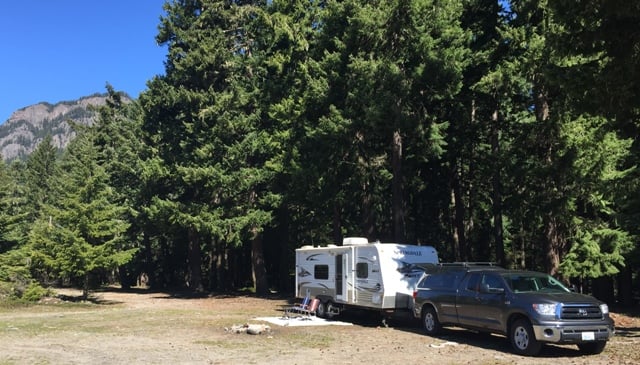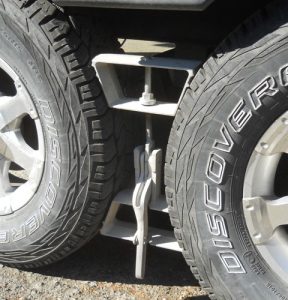Did you take the plunge and buy your first RV at one of the RV shows this winter? Are you getting ready to hit the road and head out on your first camping trip? Listed below is a brief, yet important checklist to ensure a great and safe season without any problems.

Follow these key tips and start your first season without any issues.
1. Choose the right route
If your choice was a larger rig, be sure to plan your trip to avoid traveling roads that have overpasses too low for you to safely clear or twisty roads and streets that are too narrow to comfortably navigate.
Plan ahead and research the most favorable route to get to the campground without having to deal with these challenges along the way. It’s also a good idea to book a campground in advance as well. You can easily plan your travels and find campgrounds on RV LIFE Trip Wizard.
2. Level your RV upon arrival
Always take the time to level your RV upon arriving at your destination. This is essential to do, even after the longest of journeys.
Not only can it be very uncomfortable when you are trying to relax or sleep inside the RV, but it can cause your unit (especially the refrigerator) to not function properly. Level your RV when you arrive at camp so you don’t have to be concerned with any issues later on.

Remember to pull the wheel chocks
3. Remove the wheel chocks before departing
You just enjoyed the weekend camping, and everything is all packed up, put away and ready for the drive home.
However, when you shift into drive, your rig doesn’t want to move. Resist the temptation to step on the gas a little harder as it is very likely your wheel chocks (which prevented your rig from rolling away during the weekend) are still in place.
If you are lucky, other campers weren’t watching and you can covertly go remove them. Putting chocks away is typically one of the last things you will do before heading out, and it happens more than you think.
4. Don’t drive away while still connected
If you have been hooked up to water, sewer, power, or all three while camped, it is obviously important to ensure you are disconnected before departing the campsite with the RV.
This could prove expensive to your RV or campsite utilities in the process of trying to drive away. Always double check that your RV is free and clear and ready to hit the road before you actually pull out of your campsite.
5. Don’t stay at home too often
If you make the commitment to buy an RV, then you should make the commitment to set time aside and use it as frequently as possible. Even if you can only escape for short trips, look for fun and interesting places to RV that aren’t too far from home.
In Western Washington, where I live, we are blessed with so many places to RV close to home. Ocean beaches, Puget Sound, the Cascades, and Eastern Washington are all within easy reach for a weekend RV getaway.
While making mistakes is just human nature, you can avoid them with a little forethought and effort, which can possibly save you from costly repairs or operating your RV in an unsafe manner. Damaging your RV during your first outing is one adventure in RVing nobody needs to experience.

Dave:
I would change #4 to Never Move you Rig without a Walk Around. using a checklist. Both my wife and I do a walk around with the lights and flashers on.
All the lights on & flashers working
Hitch
Ball set in coupler with safety latch and pin in place
Emergency brake cable attached and passing through ball safety pin.
Safety chains attached
Electric cable secure, i.e. the cover is snapped down
Anti-sway system installed
Setup
Electric disconnected, stowed and cover snapped down
Water disconnected, covers back on receptacle, hose drained, filter drained, covers on all ends
Sewer kine stowed, black & grey water valves closed and cover on
TV cable disconnected and stowed
All five jacks up and blocking stowed
Chalks, blocks, anti-roll devices removed and stowed
Trailer
Propane turned off
Refrigerator doors snapped shut
Overhead compartments secured/locked
All flat surfaces cleared
Hot water heater circuit breaker off
All doors and covers closed/locked
TV antenna down
Awning secure
When leaving in your vehicle pull out for about 10 feet , get out and make a walk around to make sure nothing is still down or connected
Ray, Thanks for sharing.
and make sure there is nothing left behind trash or garbage pack it in pack it out
This is an excellent list. Thank you for taking the time to write it all down.
Happy Trails to you.
Might also add:shut off water pump. I neglected to do this once and road vibration caused handles to move,turning on the kitchen faucet which sent water all over the floor and into the heater ducts.
!!! Thanks Tom. !!! I never thought of that! What a mess that would be.
Save your back and knees: Tape a mirror to a yardstick and use it to check jacks and any other conditions under the vehicle.
All good advice.
I use all the physical work involved with my camper as part of my workout program so I like the getting up and down, lifting, hitching, etc. keeps this 71 year old gal limber and in shape!
also steps stowed into trailer
This is a good check list, Thx
Secure shower door
Secure any sliding doors ( bed room, closets etc.)
Be sure awning is rolled up and secured
Turn on power from battery so it will be charged when you arrive at the next campsite
Raise stabilizers
Close all windows
If you have a roof TV antenna, be sure to lower before moving. You might even use a sticky note to remind you.
Attach a sign or some other object to the antenna crank as a reminder. In a motorhome, attach it to the steering wheel.
Best one I use, Keys hung on crank. Can’t leave without them.
Make sure spouse is on board!
Who?…oh, yeah…the wife….thanks! LOL!
As someone waiting for the weather to change so I can take that first trip with my brand new RV, there are so many other things that ran through my mind as needing to be on a checklist for “Before Your First RV Trip” for first time RV’ers. These items are interesting, but the list is woefully short.
One thing you can never have enough of is toilet paper. I’ve ran out before and just decided to soil myself rather than using a corn cob.
THAT IS CORRECT
i hate taking a crap
i hate picking out toilet paper
1ply 2ply 3ply disisions disisions
to fold or not to fold my too paper
i thought my daughter at young age to fold it’s the military way, grampa’s way
wadding only ends up smearing that mess ..
then there the rest room on the road with the dispenser you practically have to stand on your head to get any …I hate that !!! what gives ….
and we all have had this happen THE DREDED RIP POKE AAAAAH SH**…
I hate taking a crap …
and i hate it when my wife dose LOL
im going to stop eating see what happens …
well the list gos on
dont get me started
crapping is a american issue
heck its a world wide issue
well thats all
gun smoke here
yup a check list is a good thing .
i do a walk around with the lights all on.
but in 25 yr’s
iv left my steps down.
riped off my antenna
pulled my power out of the wall socket
all the food in the fridg empty on the floor
for got to flush the toylet full of cemical . no poopeee
when we stoped to get gas my dog got out of the class A
we all turned around an said hey look there go’s a dog that looks like Cree.
hey HEY that’s CREEEE get him lol
i dont know what works over the yr’s iv gotten better
but my wife never remembers a thing
Thank you for admitting your human and know that your not alone! I got a good chuckle out of that !
Great article, can’t have too many of these reminders
my KISS mnemonic/mantra:
“what’s down is up,
what’s up is down,
what’s out is in,
what’s in is out,
what’s on is off,
what’s off is on.”
and the all-important walk around, or two
maybe it’s a stretch, but it makes me think
Making sure I leave no trash behind. I bought one of those pick up extension/grabbers for $4 at harbor freight. As soon as practicable after setting up camp I make my first pass over the entire campsite picking up anything left behind by the previous campers. While we are there I will make at least two more passes,usually finding small pieces I missed the last time. It feels good to know the next visitors will enjoy a pristine site.
I put pets in pop up carriers and place the carriers inside a shallow box on the bed. Pop up carriers have more support if If you have more than one pet you need more than one pop up carrier. I have more than one pet so I have several pop up carriers in shallow boxes and I connect the boxes together with large zip ties so there is less chance of them sliding around. I also installed 4 large eye hooks, one on each wall of the bedroom and use rope or straps to connect to pop up carrier end boxes so that the carriers are secured from all four sides. No sliding around and no worries that they will tip over.
I have read much about emptying your fresh water, gray water and black water tanks. From my experience on the road I have found that it is best to empty my gray and black water tanks before heading out but fill my fresh water tank all the way full. Half empty tanks slosh around when you are driving and can cause the RV to sway on the road (I have had this happen). I would empty the fresh water tank but have found that I need water on the road and fresh water may not be available at the next place I stop to camp so I keep it full and I also tote extra water in gallon jugs. I put a water filter on the hose for any incoming water, I also boil water for 3 minutes and let cool and put it through a water filter before using for cooking or pets. I keep several gallons of my prepared water in gallon jugs as I usually need them on the road when I don’t have time to stop and boil water.